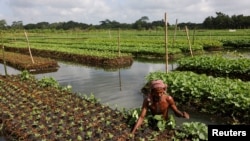“There are many culprits behind today's food crisis,” said USAID Administrator Samantha Power at the World Food Prize Borlaug Dialogue. “But the truth is, climate change is wreaking havoc faster than we can respond.”
“Temperatures and flood waters are now rising faster than emergency assistance budgets. There is no way we can keep up simply through cash or food aid. The course we are on is unsustainable. If climate change were to lead to multiple, simultaneous breadbasket failures in coming years – the potential is too dark to imagine.”
But there is a path out of the darkness – a path forged by the creator of the World Food Prize, the agronomist and Nobel Peace Prize Laureate Norman Borlaug, who is widely regarded as the Father of the Green Revolution.
After many years of research, Dr. Borlaug “created new strains of staple grains like wheat and rice that helped bring about significant food production increases across Asia and Latin America,” said Administrator Power.
“Today, as we stare down a global food crisis and as we have to anticipate more climate-induced pressure on food production in the future, it is clear that we must learn the lessons of the past, and tailor and scale our methods to the world that we now face … We need to accelerate and dramatically expand efforts to transform what we grow, how we grow it and who benefits.”
“Genome sequencing allows scientists to rapidly select the most desirable varieties to cross – in some cases, shortening the breeding process from years to a matter of months,” said Administrator Power. “USAID is supporting this kind of accelerated breeding around the world.”
“In the 1990s, USAID and the Rockefeller Foundation supported a talented young Ethiopian scientist who bred new varieties of sorghum resistant to drought and the parasitic weed striga. The new seeds, distributed in twelve countries across sub-Saharan Africa, including in the Horn, quadrupled yields even in areas facing severe drought.”
That scientist was Dr. Gebisa Ejeta, who won the World Food Prize in 2009. “Today, we’re supporting a new generation of African scientists building on Dr. Ejeta’s work. … USAID will invest nearly $3.8 million to support the ISAAA AfriCenter, Kenyatta University, and Addis Ababa University … to develop new “Striga-smart” varieties of sorghum,” said Administrator Power.
“The primary lesson of the Green Revolution was clear – with investments in agricultural productivity and fundamental research, food supply can grow faster than demand.”






